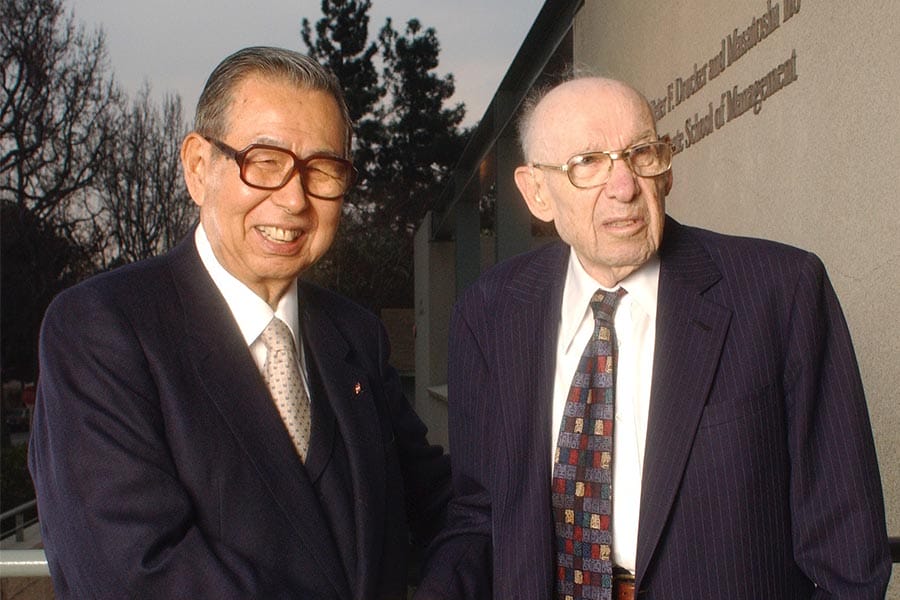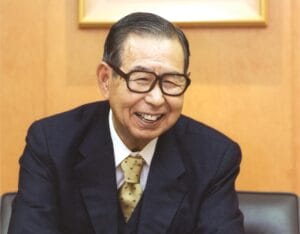Passings: Masatoshi Ito, Business Icon, Friend of Drucker, and CGU Benefactor

Masatoshi Ito, the visionary founder of one of Japan’s largest holding companies and a longtime friend and associate of Peter Drucker, has passed away in Tokyo. He was 98.
Mr. Ito had a profound impact on consumer-oriented business in Japan and beyond, as well as a definitive impact on the campus of Claremont Graduate University, which named its management school in honor of his friendship with Drucker and his family’s generosity to CGU.
In a message to the university community, President Len Jessup described Mr. Ito as a financial giant who never lost sight of the relational aspect of business—a view he shared with Drucker.
“Peter Drucker and Mr. Ito both believed in the human side of management, and that led to their forging a very strong and warm relationship,” Jessup said. “They continue to inspire us every day, and their legacies will never be forgotten.”
Mr. Ito’s career, which took him to the upper echelons of Japan’s business community, began shortly after World War II at a small, family-run dry goods store in Tokyo. When he took over the business after the death of his older brother in 1956, the company had 20 employees. Over the next 15 years, he turned the operation into a chain of one-stop stores that sold everything from groceries to clothes. The newly renamed Ito-Yokado appeared on the Tokyo Stock Exchange in 1972.
Ito-Yokado took a major leap shortly after going public when one of its young executives took note of a 7-Eleven store during a visit to the US. Intrigued by the business model, Mr. Ito forged a deal with parent company Southland Corp. and opened Japan’s first 7-Eleven in 1974. In 1991, Ito-Yokado acquired a controlling stake in Southland and the business flourished, growing to more than 20,000 7-Eleven stores in Japan and 83,000 worldwide with annual revenue in the billions. In 2005, Seven & i Holdings was established as the holding company of Ito-Yokado, Seven-Eleven Japan, and Denny’s Japan—the “i” in its name in honor of Mr. Ito, who at the time was the company’s honorary chairman.
“I am frequently asked if I succeeded because of hard work or because I was just lucky,” Mr. Ito said in an interview with the Journal of Japanese Trade & Industry in 1988. “Actually, the answer is some of both. I was fortunate to have started out in business right after the war—the same time that a broad-based consumer society was beginning to develop in Japan.”

Mr. Ito met Peter Drucker in the early days of the robust expansion. What started as a client-consultant relationship grew into a friendship that lasted more than three decades.
“Whenever Mr. Ito was in this country or when I was in Japan, I spent an afternoon or a day or a long evening with him. … He credits me, quite undeservedly, with a lot of his success,” Drucker said.
Drucker advised Mr. Ito to keep his numerous businesses “medium sized” in order to increase efficiency and limit rapid expansion, which would become unwieldy. This plan, noted Drucker, was “phenomenally successful.”
Mr. Ito had great respect not only for Drucker’s business acumen but also for his academic work at CGU, which grew to almost legendary status, attracting students from around the world, including Japan. Over the years, Mr. Ito and his family donated $23 million to the school, including a landmark $20 million endowment in 2003 that helped fund the school’s new home, which remains a signature building on campus.
Professor Hideki Yamawaki, the Ito Chair of International Business and Professor of Management at the Peter F. Drucker and Masatoshi Ito Graduate School of Management, first met Mr. Ito when he visited Claremont about 20 years ago. The two visited regularly over the years.
“He always greeted me with a big smile,” Yamawaki recalled. “He was a very sincere and honest person, which was a hallmark of his leadership. He was that way with customers, suppliers, and employees. He always emphasized trust. You could feel it.”
During one of their later visits, Mr. Ito reflected on the company’s burgeoning growth and reminisced that he was happier when it was a bit smaller—when he could talk with customers and employees.
“Those on-site visits were very important to him,” said Yamawaki, who is grateful to serve as the Ito Chair.
“Mr. Ito was very close to Peter Drucker. He called Drucker sensei. To carry on his name is a great honor—it’s part of a great legacy.”
Dean David Sprott did not have the opportunity to meet Mr. Ito, but he says his and Drucker’s presence are palpable at the school—in the classrooms and curriculum, and among students.
“The guiding principles of Peter Drucker are our bedrock. To a significant degree, Mr. Ito built an amazing business upon that bedrock, which makes him a role model,” Sprott said. “Masatoshi Ito is so much more than a name on our building. His legacy is an inspiration.”
Mr. Ito’s epitaph may best be summed up in his own words, which he shared in an interview several years ago:
“The single most important asset a business can have is trustworthiness. It is not achieved through money or physical possessions, however, but through personal integrity, earnestness, and above all, probity.”